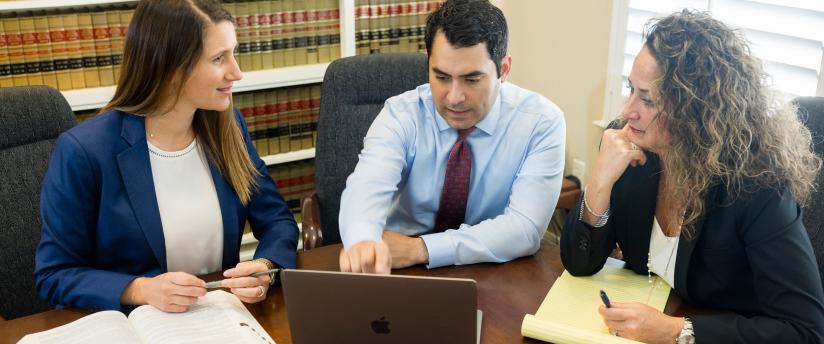Felony Lawyers in Austin, TX

Felonies are the more serious of the two classes of crimes in Texas. They come with commensurately serious punishments. A person convicted of even the least serious felony may have to serve a term of two years in state jail, pay a fine of $10,000, and be on probation for up to five years.
Even after serving these penalties, a convicted felon will face significant restrictions on their liberties. Felony convictions remain on a person’s criminal record permanently. These can have detrimental consequences on a person’s chances of finding employment or a place to live, being admitted to higher education, and owning a firearm.
If you are facing a felony charge in Austin or the surrounding areas, your best move is to have a skilled criminal defense attorney on your side. The experienced lawyers at Minton, Bassett, Flores & Carsey, P.C., have the resources, knowledge, and determination it takes to defend your rights and freedoms. Call or contact us online today for a confidential case evaluation, and we will discuss your legal options.
Why Hire Us If You Are Facing Felony Charges in Austin, Texas
For 50 years, we at Minton, Bassett, Flores & Carsey, P.C., have known that the people who walk through our doors are at a particularly challenging crossroads in their lives. That’s why we’re committed to treating them with the respect, compassion, and understanding they deserve. Following these principles isn’t just the right thing to do – it also is the best way for us to obtain the favorable results our clients need.
Furthermore, the felony defense attorneys who make up our team are all trial lawyers eager to take on challenges. We will do all we can to have the charges dropped or, if possible, get the court to agree to reduce a felony to a misdemeanor. We thrive in a courtroom setting and are ready and willing to defend our clients in front of judges and juries. Our mission is to craft the strongest possible defense on your behalf and fight aggressively for you at every step.
What Is Considered a Felony Charge in Texas?
In the state of Texas, all crimes are classed either as misdemeanors or felonies. Felonies are the more serious of the two. Some of the common types of cases that are considered felonies are included on this list:
- Aggravated Assault – This charge applies when a person is accused of causing serious bodily harm that creates a substantial risk of death or that causes death, serious disfigurement, or disability of any body organ. This is generally a second-degree felony but can be elevated to a first-degree felony under certain circumstances.
- Assault with a Deadly Weapon – A person can be charged with assault with a deadly weapon if they caused serious bodily harm with a firearm or another item that is made, adapted, or intended specifically to cause death or serious injury to another person.
- Burglary – Burglary is defined as theft that occurs when the accused enters a building without the consent or knowledge of the owner.
- Drug Charges – Whether drug charges are classed in Texas as a misdemeanor or felonies depends on the type and amount of drug, as well as the nature of the particular activity in which the defendant is accused of engaging.
- Evading Arrest or Detention – Depending on the circumstances and prior convictions, a person who intentionally flees from a peace officer who is lawfully attempting to arrest or detain them can be charged with a felony crime of evading arrest.
- Felon in Possession of a Weapon – After a person is convicted of a felony and has served their jail or prison sentence, they often will serve a five-year probationary period. They are barred from possessing a firearm during this time. Those who violate this rule may be charged with a third-degree felony.
- Injury of a Child – A person who intentionally, knowingly, recklessly, or with criminal negligence causes injury to a child 14 years old or younger will face felony charges of injury of a child.
- Rape or Sexual Assault – Most instances of sexual assault are classed as second-degree felonies. However, the offense may be upgraded to a first-degree felony if there are aggravating factors.
- Stalking – Under Texas law, “stalking” is defined as behaving in a way the accused person knows will make the victim fear for their life, safety, or property, and doing so more than once. The state takes these crimes seriously, as stalking is a significant risk factor for femicide (homicide of women) in abusive relationships. It is usually classed as a third-degree felony. However, it can be enhanced to a second-degree felony if there is a prior conviction.
- Arson – Arson is the act of setting fire to property. In most cases, Texas law classes it as a second-degree felony. A prosecutor can upgrade the charge to a first-degree felony if the accused started the fire intentionally, and it resulted in the actual bodily injury or death of another person, or if the fire was intended to damage a person’s home or a place of worship.
- Kidnapping – Kidnapping, or holding someone captive against their will, is generally classed as a third-degree felony. Depending on the circumstances, aggravated kidnapping is a first- or second-degree felony.
- Manslaughter – This second-degree felony occurs when someone’s recklessness causes the death of a person.
- Murder – A person can be charged with felony murder for causing the death of another individual while the defendant is committing a felony (other than manslaughter). This is the case regardless of whether there was any intent to kill the victim.
- Robbery – This occurs when, during a theft, a person causes bodily injury to another individual or causes the victim to fear that they will suffer injury or death.
- Theft, Fraud, Embezzlement – These crimes can be charged as misdemeanors or felonies, depending on the value of the property or amount of money stolen.
- Weapon Charges – Several crimes fall under the category of weapons charges, some of which are classed as felonies.






